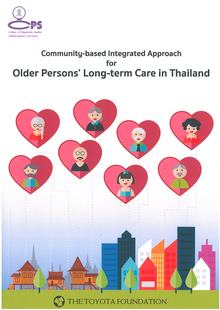Grant Projects: Products
"Community-based Integrated Approach for Older Person’s Long-term Care in Thailand " came out.
update:March 5, 2015
Thailand is facing a rapidly aging population. In about 25 years, one in every three Thais will be 60 and above. With its economic and social development is still ongoing, Thailand, unlike developed countries, is a nation “getting old before getting rich”. Providing care for the elderly has become one of the most urgent necessities under the context.
This project, based on the investigations in eight communities in seven provinces of Thailand where community-based integrated long-term elder care is available, aims to propose ‘best practice’ for community-based integrated long-term care and improved access to quality long-term care. The project seeks to draw up a set of guidelines and organizational models, such that the core essence of any recommendations can be replicated by any community in Thailand.
The main features of the community-based long-term care for the elderly within the community figured out through 3-M (‘Man’, ‘Money’ and ‘Management’) + I (Information) framework analysis.
Based on the evidence found in the current community-based integrated long-term care systems, the following development directions have been proposed;
1. The definition of long-term elderly care should be expanded to cover more diversified services, including both attentive assistance and watchful treatment. A more holistic approach or care for the overall well-being of the elderly can be focused upon, rather than just on bedridden or disabled older persons.
2. There should be more financial contribution from diverse sources to strengthening the Sub-district Health Fund which arose from the cooperation of three entities: the National Health Security Office, local government and communities. For example from provincial administrative organizations, members of community, or Buddhist monasteries.
3. In order to avoid the problem of lack of leadership, and to enhance coordination and cooperation among various stakeholders at the local level, new mechanisms should be established such as a “Committee for Community Long-term Care for Older People”.
4. Because of an expected shortage of caregivers in the future, human resources development in the area of long-term care for older people at the community level should be undertaken. There are three main providers at the community where community-based long-term care is available: senior citizen centers, elderly care volunteers, and village health volunteers, under supervision of sub-district health promoting hospitals.
This publication came out as a result of the project titled the same supported by the Toyota Foundation’s 2013 International Grant Program, headed by Dr. Worawet Suwanrada.
For the summary of the Foundation-funded project, please search by "D13-N-0106" in our "Search Project" page.
